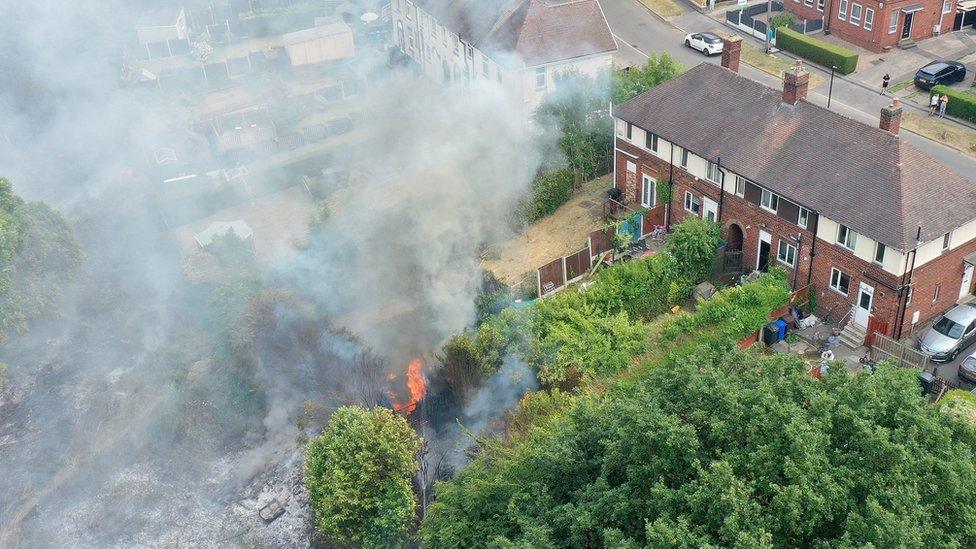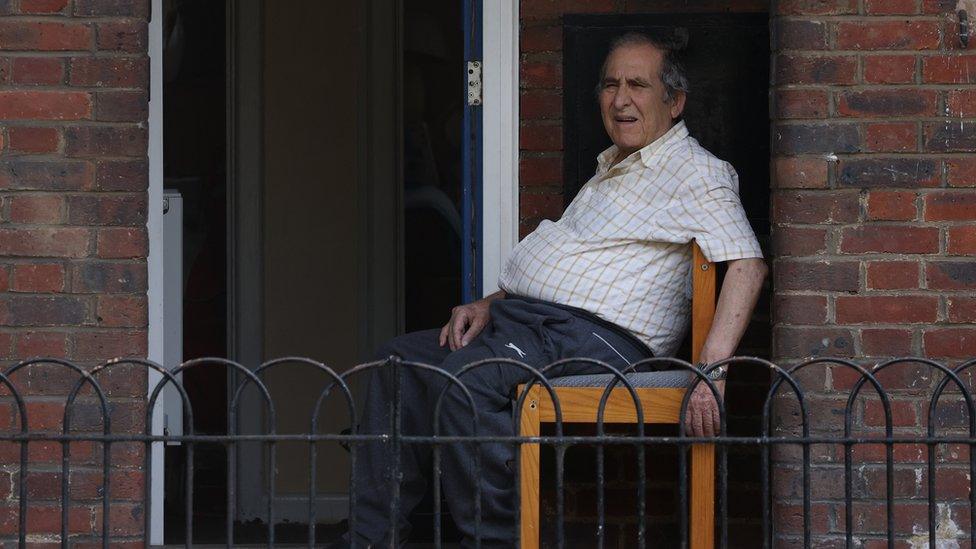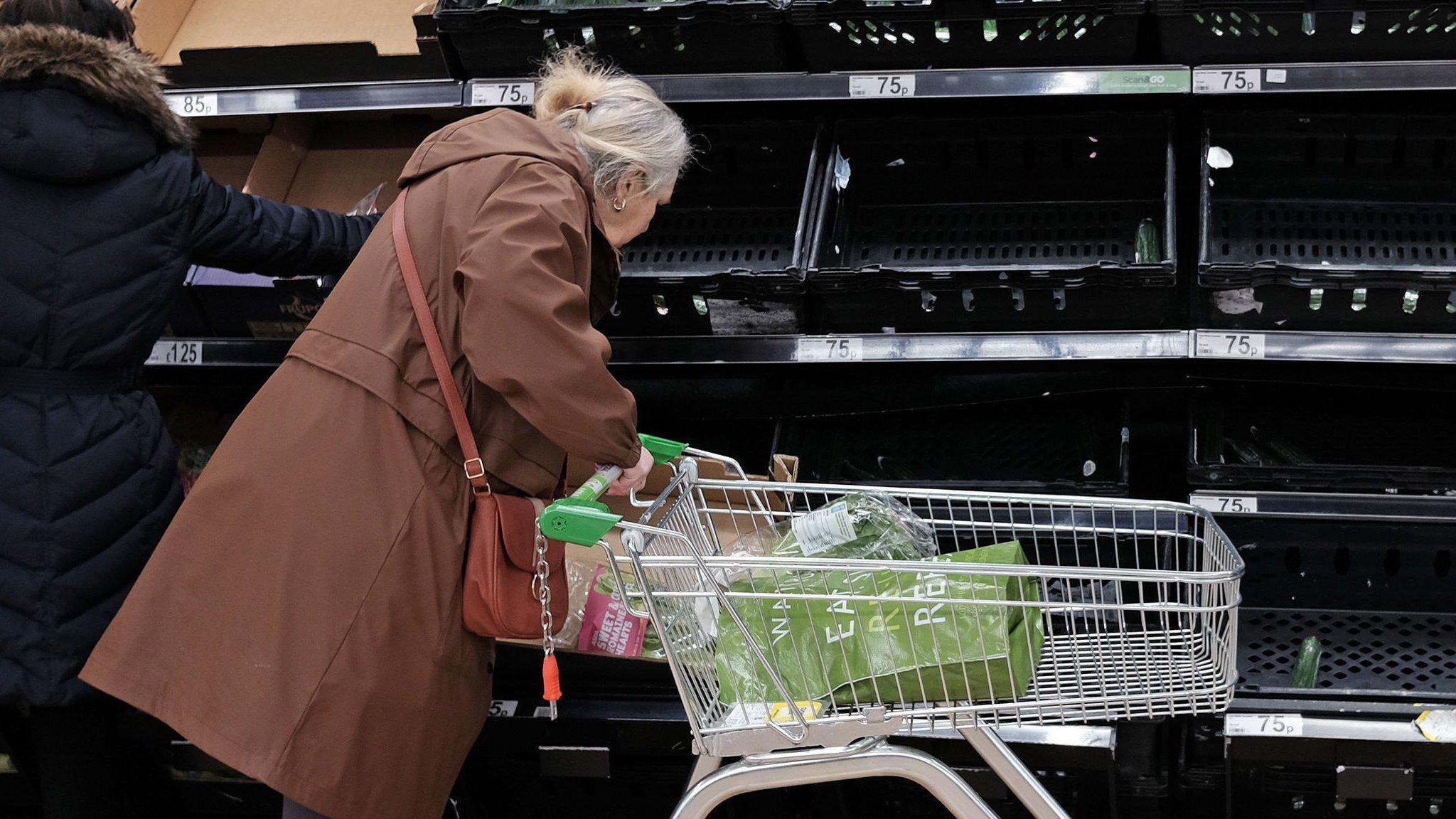Climate change plan will leave UK unprepared, advisers warn
- Published

The UK suffered extreme heat and wildfires last year likely made worse by climate change
The UK is still not treating climate change as a national priority, warn the experts who advise the government.
They criticised the latest government climate change adaptation plan for not containing any substantial new money or new legislation.
The five-year programme, released on Monday, includes measures to tackle overheating and flooding.
Secretary of State for Environment Therese Coffey defended the plan as a "step change".
The Third National Adaptation Plan (NAP) outlines how the government intends to prepare the UK for climate change from health to housing.
Before publication the UK Committee on Climate Change (UKCCC) called on the government to make sure the third plan matched the scale of the challenge the country is facing.
Following its publication on Monday, Baroness Brown, Chair of the Adaptation Committee of the UKCCC, said that the plan shows that preparing for climate change still needs to be made a more important priority for the country.
"This is progress on previous plans... but we are disappointed the government hasn't used this opportunity to go further," she said. "In another summer of gruelling hot temperatures, water shortages and wildfires, it's hard to make sense of that decision. We are at the stage where promising further action is not enough.
"The scale of the climate impacts we are seeing make clear that resilience to climate change should be a much greater national priority."
The UKCCC noted almost all the measures are re-announcements of existing commitments from other plans like the Environment Act.
Trudy Harrison, minister for climate adaptation, said: "We are absolutely serious across government. What we have set out today is billions of pounds of investment to protect the most vulnerable communities."
She said the government had taken on board the climate change committee's comments.
"There's always more to do. This is a five-year plan," she said.
New proposals in the plan from government include:
constructing new public buildings that are designed to deal with higher temperatures
investing £15m in researching solutions to climate change; and
piloting a new climate risk information service
As global temperatures continue to rise the risk of extreme events in the UK, external such as high heat, winter flooding and storm surge increases.
Last year, during the most intense heat wave the country has ever faced, there were 25,000 wildfires from the moorlands of greater Manchester to the gardens of east London. Hospitals struggled to cope - around 3,000 more deaths in the over-65s than usual and 20% of operations were cancelled.
Alongside flooding, overheating is one of the biggest risks, external the UK population face from climate change.
Dr Chloe Brimicombe, researcher in heatwaves at University Graz, told the BBC: "The reason that it's a massive risk is that it causes significant health issues especially for vulnerable groups. It causes health issues like dehydration, heat stress which they might need to go to hospital for."
The government wants contractors who build new schools and hospitals to implement cooling measures like shaded windows, green roofs and more open spaces. But there is no new legislation or funding for updates to existing homes to make sure they are protected.
Under a scenario where global temperatures rise by 2C all homes in England and Wales are at risk of overheating according to energy consultants Arup, external.
In dense urban areas like London, Manchester and Birmingham populations are particularly at risk.
Rezina Chowdhury, Labour deputy leader of Lambeth council in south London told the BBC: "Our communities feel the effects disproportionately with poorer households... and our residents live in flats without outside space."

City dwellers struggled with overheating homes last year during the UK heatwave
But she said that there is no secure funding: "It is like Hunger Games where people are having to fight for pots of money to do the work we should all be doing."
Local authorities are being offered advice and information from a new climate advice service to help them tailor their response.
This move has been welcomed by Linda Taylor, environment spokesperson for the Local Government Association, the national body for authorities in England and Wales.
"But while access to Local Authority Climate Data could provide some good learning and understanding for councils, they crucially need the resources and money to take action on their findings," she said.
The UK is not just vulnerable to heat at home but also abroad. The UK only produces, external 16% of its fruit and 50% of its vegetables domestically, relying on imports, mostly from Europe, to fulfil the shortfall. Therefore any extreme weather events in Europe could effect the supply here.
Earlier this year the UK experienced shortages of cucumber, tomatoes and other popular vegetables after poor weather in Spain, and now the same region is baking under an intense heatwave. which could further damage crops.
The UKCCC recommended in March that the government require, by law, all large food companies to assess the climate risks to their supply chains.
The government did not propose this in the NAP. It said that a new Food Security Strategy would be produced for next year but industry was best placed to deal with the issue.

Low rainfall in Italy and Spain last year led to shortage of key vegetables in the UK
Flooding and storms are the other major risk the UK currently faces. Memorable events such as Storm Arwen wreaked havoc with UK homes and key infrastructure. In November 2021, it left one million British properties without power and internet supply.
There are no targets in the plan for improving the strength of the communications sector, which was a key ask of the UKCCC in March - but said Ofcom would look at issuing new guidance to companies to prepare for climate change.
- Published18 July 2022

- Published18 July 2022

- Published24 February 2023
